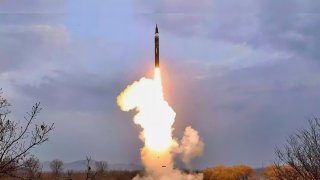Kamala Harris and North Korea: Between Continuity, Pragmatism, and Strategic Realignment
It is plausible that a Harris administration would adopt a more pragmatic and issue-specific approach, alongside a more traditional U.S. foreign policy approach. While some overtures for engagement may be advanced on an ad-hoc basis, the overarching objective of maintaining stability on the Korean Peninsula and beyond will remain paramount.
A possible future Harris administration is likely to continue the Biden administration's approach to North Korea, focusing on sanctions and diplomatic pressure. This strategy may be shaped by broader geopolitical challenges, including tensions with China and Russia. Perceived inaction could lead to larger crises, making it crucial for a Harris administration to couple a more pragmatic and issue-specific approach to the traditional U.S. foreign policy approach to North Korea.
The Current Situation
Geopolitical developments have expanded the number of fronts where the United States government has had to focus its political, military, and economic attention. This has spilled over onto the Korean Peninsula, where the Biden administration, constrained by necessity and mindful of the failures of the Trump-Kim summits, has employed a strategy reminiscent of Obama’s strategic patience.
As the administration prepares to potentially hand over the baton to Vice President Kamala Harris, predicting her policy direction toward the Democratic People’s Republic of Korea (DPRK) remains challenging. Given her current role, Harris is limited in expressing views that might diverge from the current administration yet there are already some signs that hint at possible shifts or continuities in approach.
The 2024 Democratic Party Platform released ahead of the National Democratic Convention (DNC), Harris’s speech during the Convention, and her interview with CNN can offer some insights into the general direction of her policies towards the DPRK.
These sources suggest that Harris will maintain the current course of the Biden administration’s approach to North Korea, albeit with adjustments dictated by necessity and geopolitical developments. Her promises to reinforce America’s global leadership in the struggle between democracies and autocracies, to outcompete China, and, “to hold sacred America’s fundamental principles, from the rule of law to free and fair elections, to the peaceful transfer of power,” may seem perfunctory they align her potential administration with the status quo within Democratic Party politics.
This rhetoric, coupled with the lack of direct focus on North Korea, aside from a few mentions including her labeling of Kim Jong Un as a tyrant and dictator, and the heavy focus on China suggest that Pyongyang may remain a secondary policy priority for Harris.
Similarly, the omission of DPRK denuclearization, human rights, or efforts to engage Pyongyang from the DNC document, seems to support this notion. It appears likely that Harris would continue the incumbent administration’s approach of maintaining sanctions and pressure to ensure North Korea’s isolation while refraining from offering concessions or engaging in direct talks.
Such a passive stance, adversarial rhetoric, and belligerent posturing are unlikely to deter North Korea from pursuing the “five-year military development plan” outlined in 2021 and may do little to counter the burgeoning coordination between Russia, China, and North Korea.
However, this shift in posturing and focus might reflect a broader change in Washington’s strategy. The United States is currently engaged on multiple fronts, including the prolonged war in Ukraine, the Israel-Palestine conflict, heightened competition with China, and managing relations with its transatlantic allies and regional organizations such as NATO.
Consequently, having fully realized that the DPRK has less incentive to deal with the United States and the necessity to reduce or simply avoid the creation of new fronts, a Harris administration may seek to avoid directly provoking North Korea. The focus appears to be shifting from the increasingly unattainable goal of complete denuclearization to managing North Korea’s nuclear capabilities through arms control measures.
Therefore, it is plausible that a Harris administration would adopt a more pragmatic and issue-specific approach, alongside a more traditional U.S. foreign policy approach. While some overtures for engagement may be advanced on an ad-hoc basis, the overarching objective of maintaining stability on the Korean Peninsula and beyond will remain paramount. U.S. defense expenditures will continue to grow to ensure the maintenance of deterrence capabilities, both through punishment and denial.
Harris and her administration are likely to continue the Biden administration’s offshore balancing strategy: strengthen regional alliances, particularly with South Korea and Japan, both bilaterally and trilaterally, and bolster the capabilities of regional institutions such as the Quadrilateral Security Dialogue (QUAD), and particularly the United Nations Command. Additionally, a Harris administration would likely support the increased presence and interest of NATO members in the Indo-Pacific region.
About the Author
Riccardo Villa is the Project Coordinator and Junior Research Fellow at ISDP’s Asia Program and Korea Center, and also serves as Director of Security Affairs at The New Global Order, a Rome-based think tank. He is also Kelly A. Korea Fellow at the Pacific Forum conducting research on nuclear non-proliferation and military advancements and innovation on the Korean Peninsula. His research primarily addresses inter-Korean relations and Northeast Asia's security dynamics, specializing in arms control and mediation.
Image Credit: Creative Commons and/or Shutterstock.


